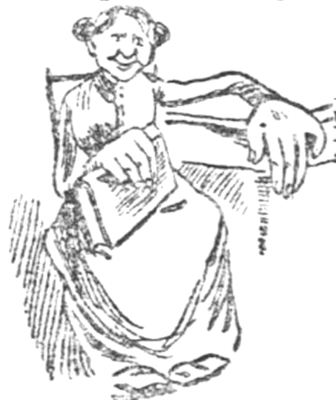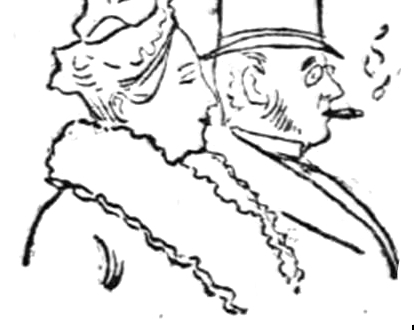This article has been transcribed from a copy of the Cardiff Times in the online collection of scanned Welsh newspapers 1804-1919 in the National Library of Wales, with grateful recognition of the free access accorded to all readers. Paragraph breaks have been introduced for easier reading.
This article uses the holiday to exploit both Cardiff, with which at one time Samuel was very familiar, and the Yorkshire which has featured prominently in his recent numbers. He laces his narrative with references to places in South Wales – Penarth, Llanelli, Dowlais – and Weston-super-Mare across the Bristol Channel, including characteristically Welsh speech as he goes. Then, suddenly, after doing his best to establish himself in Cardiff and its environs, he reverts to Yorkshire with his description of the Sunday-school tea-fight of the Lady-lane Methodist Chapel of Leeds.
‘Samuel’s Sentiments’ is probably written quite hurriedly, and no planning goes into the coherence of the series. Why Samuel does not choose an event held by the Wesleyan Methodists of Cardiff or Whitchurch is not clear. As it is, Rip Van Winkle’s wish for future prosperity applies to a distant community. Bizarrely, the interlocutor who invites Samuel to West Yorkshire is deliberately presented as Welsh, the expression ‘I’ll tell you what it is’ being characteristically Welsh English. The illustrations appear to be stock images held by the newspaper, and can at best be described as randomly chosen. The article is appropriately entitled ‘Samuel's Half-holiday Wandering.’
‘Ancient of Days’ is a name for God in the Book of Daniel and in numerous hymns. ‘Fresh fields and pastures new’ is a frequent, more-or-less traditional, misquotation of Milton, “Lycidas” (l. 193 ), ‘Tomorrow to fresh woods, and pastures new.’ Thomas Hardy’s novel Far from the Madding Crowd appeared in 1874, taking its title from Thomas Gray, ‘Elegy written in a Country Churchyard’ (1751). This poem was very well known, and the two works help ‘Samuel’ to make the suggestion that by taking a day trip by paddle-steamer from Penarth to Weston-super-Mare, holiday makers may think they are getting close to Hardy country. ‘Dowlais folk’ are employees of the iron works at Dowlais, which was at one time the largest in the world, and a principal plant in steel production by the Bessemer process. ‘[T]heir muttered threats as to what they would do on “another day”’ is presumably a reminder of the miners’ strike in 1873, which particularly shocked the middle-class Victorian public because women workers also took part. See Illustrated London News, 18th January 1873, 'The strike in South Wales: Tip girls leaving the Dowlais Works.' There were also memories of the ironworkers’ strike of 1853 and the Merthyr Uprising of 1831, when crowds were fired on the by the 93rd (Sutherland Highlanders) Regiment of Foot. The ‘great National holiday’ has not been identified. The narrative is full of Shakespearean and pseudo-Shakespearean phrases, such as ‘good my lords’, ‘it likes me well’ and ‘cakes and ale’, and archaicisms such as ‘an’ in the first paragraph and ‘sirrah’. ‘[B]e still, my fluttering heart’ is a typical poetic paste jewel of the period. It is amusing to see the momentary shift in register to the language of Benthamite economics in the ‘tightness of the money market just now’, helping to provide an overall impression of broad, almost shimmering reference. —David Skilton

PON my word, sir, a half-holiday is a merry time, an [if] the elements be propitious and Nature condescends to wear an 18-carat, warranted-not-to-shrink sort of smile. Perhaps, oh ancient of many days, the heading to this communication is somewhat of an inappropriate one, for, in good sooth I did not wander very far, partly in consequence of a total inability to make up what I am pleased to call my mind, and partly also to the prevailing (with me) tightness of the money market just now. The fact is, sir, that I am selfish enough to detest public holidays, though my want of appreciation of them does not lead me so far as to wish that it may rain, as do some amiable young females who have no new clothes to go out in. But I can’t bear being elbowed out of my usual haunts, and am I disposed to go away to fresh fields and pastures new [.] I am snob enough to be intensely irritated by the presence of the host of pleasure seekers who spoil my sport. There is a stolidity about the young men even in the midst of the most charming scenes, and a giggling appreciation about the young women in the same circumstances, which are as pins and needles to me. I can't bear, sir, to see the lavish display and generosity of the young man who has palpably been ‘saving up’ his money for a couple of months before. I like men myself who take their pleasures equably and regularly – who enjoy themselves all the year round, in fact. The men who go in for saving up and then have a ‘buster’ almost invariably suffer from after regrets – they have reproachful visitings, and are inclined to blame the companions of their festivity for the unwonted expenditure usual on such occasions.

Portrait of a lady taken at holiday time. Something wrong about the focus somehow.
It is often said that there is nothing certain but the unexpected – well, in my view there is nothing really enjoyable but the unexpected. Elaborate preparations, pleasurable anticipations, cut-and-dried arrangements for a holiday excursion are all too cold-blooded for me, sir; they savour too much of method. To drop unexpectedly on an acquaintance who proposes a jaunt and takes me hot-foot – that's the sort of holiday for me, for every event thereof comes freshly and as a surprise. Realisation is but too frequently miles below anticipation so far as pleasurableness is concerned, and when to one's anticipations are aided anxious misgivings as to the weather and as to whether ‘A’ or ‘B’ will put in an appearance, the carefully rehearsed holiday becomes something of a drag rather than a delight.

The nice sort of boy one meets at tea-fights.
But this is a digression, as the penny novelists say. Let me to my muttons [subject]. Candidly, my wanderings at this jocund time have mainly been amongst those scenes which are as familiar as a thrice-told tale to many readers of the Cardiff Times. I have gone with the madding crowd to Weston [super-mer], and joined in the promenade on the Penarth Beach. I have even taken part in the great National holiday, and listened to the strains of sweet music at the Bridgend Eisteddvod, [sic] noting the jubilation of the Llanellyites, and the muttered threats of Dowlais folk as to what they would do on ‘another day.’ I have not yet taken part in a miners’ monthly holiday. That is a pleasure yet to come. I have, however, seen ‘Shoni-boy’ [Johnny-boy] and his wejen [sweetheart] disporting themselves in numbers too large to be pleasant. ‘Let us to more placid scenes,’ said I. ‘Let us to sylvan glades, to –––,’ ‘Oh, stow all that, Samuel,’ was my friend's prosaic comment, and then he added – ‘I'll tell you what it is; I'll give you a treat; you've never been to a genuine Sunday-school tea-fight in the open air, have you? All right; the children of the Lady-lane Chapel meet not far from here; go with me. You look an unregenerate sort of lot; but I'll make that all right; I'll introduce you as a “penitent Pressman,” and the redness of your nasal organ won't then give occasion for comment.’
I fell in with the suggestion, good sir, and I went right away out into the country and sat me down on a bench and partook of some excellent Souchong dispensed by as bonny a girl as I ever sat near (those eyes, those teeth – but there; be still, my fluttering heart), and I gnawed away at sweet cake, as though my heart were really in the work, for all the highly delectable very respectable young men and maidens who were there seemed to be doing the same and enjoying the process. And I drank about eight cups of tea just to bring me in touch, as it were, with the fair maid of the urn herinbefore referred to, and I enjoyed myself thoroughly, the sweet cake notwithstanding. An amiable man, and a facetious withal, was the leader of the flock, and when he bade me to the primitive games in which they engaged I played with a will – and with the ball of course – and had it not been that I threw the ball rather too hard at a middle-aged gentleman, whose front teeth (fresh from the dentist's) I loosened, I should, I flatter myself, have rather distinguished myself. I know full well that you will be somewhat sceptical when I tell you that I thoroughly appreciated the calm and innocent pleasures that I derived in the company of the genial Lady Laners, but the truth remains all the same. ‘Their health and their families, and may they live long and prosper,’ as dear old Rip Van Winkle says.

A game at bowls, liquid refreshment of a stimulating sort, a philosophical chat with a dear old friend of 70, who possesses more than the wisdom of his years and the light heart of a youth, a calm pipe in the gloaming, and then a run into the din and clatter and bustle of the town, and then — to bed. Net a very exciting holiday, eh? No, but one of the sort that leaves at least no after regrets – and that doesn't cost much. It likes me well does that reflection, good my lords. The hand of time is beginning to weigh heavily on me, sirrah: I am beginning to be reflective; I am (at present) no longer the Samuel of the junketings and the jouet [plaything]; I will get me to penitence and leave the cakes and ale.
Last modified 12 March 2022